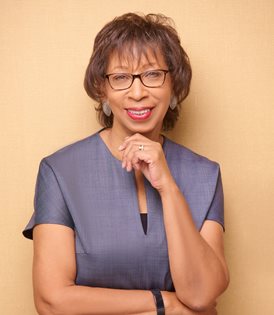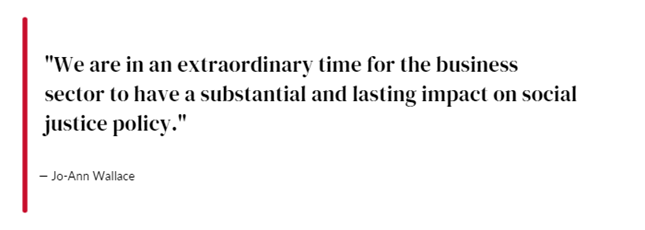Profiles
Jo-Ann Wallace Brings Access to Justice Advocacy to Insurance World
February 14, 2023
Recognized by the Obama administration as a “Champion of Change,” Jo-Ann Wallace served as president and CEO of the 111-year-old National Legal Aid & Defender Association (NLADA) for more than 20 years before transitioning to a new position in 2021. As president, CEO, and board chair of NLADA Mutual Insurance Co., a Risk Retention Group (formerly NLADA Insurance Program), Wallace is dedicated to equipping the equal justice community with insurance coverage needed to advance equity for all.
and CEO of the 111-year-old National Legal Aid & Defender Association (NLADA) for more than 20 years before transitioning to a new position in 2021. As president, CEO, and board chair of NLADA Mutual Insurance Co., a Risk Retention Group (formerly NLADA Insurance Program), Wallace is dedicated to equipping the equal justice community with insurance coverage needed to advance equity for all.
How did you come to practice law in the District of Columbia?
Working as a law student at the Public Defender Service for the District of Columbia (PDS) fueled my passion for justice and inspired me to pursue a legal career.
My passion derives from my experience with injustice. My father was among the first African Americans to join the U.S. Navy. After serving his country in World War II, he used his veterans benefits to help get a college degree and then looked for a job that would bring together his love of music and teaching. When no school system in the city would hire a young Black male teacher, he found a teaching position in a rural community. Growing up, the experiences and choices of my family members and the obstacles that directed their paths in life influenced my own life and my sense of fairness and justice.
The work of the Public Defender Service gave expression to my interest in social justice and prior experience in social services. PDS’s representation includes services that address the underlying social issues that often lead to involvement in the criminal legal system, as well as defending a person’s liberty. I was deeply moved by the extraordinary dedication to holistic, client-centered justice and providing people with the highest quality of legal representation possible. It was a privilege to become one of the “Champions of Liberty” and later serve as [PDS] director.
Describe your involvement with pro bono service. How has it impacted your work?
Throughout my career, I have had the benefit of working with dedicated private bar attorneys who have advanced access to justice through pro bono legal assistance. At both PDS and NLADA, I worked in partnership with private pro bono counsel on amicus briefs, as well as on other types of special projects and policy initiatives important to equal justice. My positive experiences with pro bono and the private bar, including collaborating with entities like NLADA’s Corporate Advisory Committee and the Association of Pro Bono Counsel, as well as individual law firms, made clear to me how much the private sector can do to advance access to justice. While pro bono alone will never be able to close the gap between the need for and the availability of legal services for people who can’t afford to pay for counsel, it makes a significant difference and also contributes in myriad ways to the advancement of equal justice.
What was your “secret sauce” to your success as head of NLADA, and how does that recipe change, if at all, in your new position?
Cross-sector collaboration is key to advancing equity and justice. All sectors of society — government, public interest, and private — have a part to play. My experience working in and with these sectors confirms that we can only make a difference if we approach this work in a unified way. Eliminating the most deeply rooted barriers to equal justice in our country requires multisector, multidisciplinary approaches, starting with the individuals and communities that are directly impacted.
That recipe for change is equally important for NLADA Mutual’s business model. The [former] Insurance Program launched an environmental, social, and governance (ESG) initiative to further expand our role as the equal justice community’s advocate in the insurance industry, to not only deliver solutions but also to share our values with the industry and address some of the problems that the insurance industry causes for community members. As one starting point, NLADA Mutual has initiated conversations with people in all three sectors to better understand how insurance, race, and justice intersect and to identify what the insurance industry can do to respond.
How are you approaching the current climate as it relates to social justice, policy change, and the business side of lawyering?
We are in an extraordinary time for the business sector to have a substantial and lasting impact on social justice policy. Research in the past few years reveals that the public has more trust in business leaders than in leaders from any other sector. People expect business leaders to step up and speak out on important social issues, and to fill the void left by a lack of trust in government leaders. The confluence of factors created by the racial reckoning sparked by George Floyd’s murder and a global pandemic heightened those expectations.
Much of the focus on the business role in social justice has been on large corporations — and there is still much more that they can do — but in many places across the globe, small business drives the economy. In the United States, small businesses account for approximately 45 percent of the gross domestic product and contribute significantly to innovation, entrepreneurship, and local economies. Harnessing that collective power in support of access to justice is among my next goals.

How will you continue your equal justice advocacy as an insurance executive?
As a former legal practitioner, I know from personal experience the importance of feeling supported: whether it's knowing that your supervisor will have your back when a judge threatens to hold you in contempt for doing your job as a public defender, or that an attorney of your choosing will fight for you if your leadership or advocacy is challenged. I also know that challenging government policies or business practices that hurt low-income communities, providing zealous advocacy for someone accused of a serious crime, or stepping out as an advocate against anti-racist policies and practices means taking risks — and those acts take courage. NLADA Mutual’s primary purpose is to equip courageous lawyers and leaders who work on behalf of low-income people with the insurance coverage they need to help them feel confident and have peace of mind as they work zealously on the frontlines of justice.
Since its inception as an independent enterprise, the NLADA Insurance Program has provided millions of dollars in financial resources to NLADA and advocates on the frontlines of justice for fundraising, training, technical assistance, and other program support. In addition to providing the best coverages, pricing, and customer service available, NLADA Mutual offers standard-setting, evidence-based training and resources to help advocates manage risk and reduce loss.
Insurance practices can have a profound impact on low-income individuals and communities. The denial of life insurance to individuals with certain types of criminal convictions, and the vestiges of legalized housing segregation and redlining that have left a disproportionate representation of low-income communities of color unable to get insurance in areas prone to environmental disasters, are two examples of the relationship between insurance and economic stability. Through our ESG initiative, the equal justice community has a newly minted and fierce advocate to take the fight for justice and equity to the insurance industry on its behalf.
Can you offer an example of the insurance industry’s positive impact on communities of color?
In St. Ann, Missouri, for example, the sheriff had a policy of encouraging high-speed chases to apprehend people accused of low-level offenses. Despite serious injuries to people and collateral property damage, neither government officials nor the advocacy community was able to convince the sheriff to change the destructive practice. Only when the department’s insurer stepped in and threatened to cancel coverage did the sheriff capitulate and change the departmental policy. Insurers in other states have also begun weighing in on police practices. These are impressive beginning steps, and there is much more the industry can do over time.
In partnership with dedicated equal justice leaders across the country and knowledgeable, compassionate insurance professionals, NLADA Mutual can play a strategic role in making significant progress toward diversity, equity, and inclusion within the insurance industry, and in expanding the industry’s clout to bend the universal arc further toward justice and equity. We can’t rewrite the past or eradicate past human suffering, but we can write tomorrow’s history by acting today with purpose and intention. I hope promoting equity becomes as deeply rooted in the organization’s objectives as “the best products, services, and prices.” I look forward to reading the chapter in the history books of the future about how NLADA Mutual and the national equal justice community helped to change an industry.


